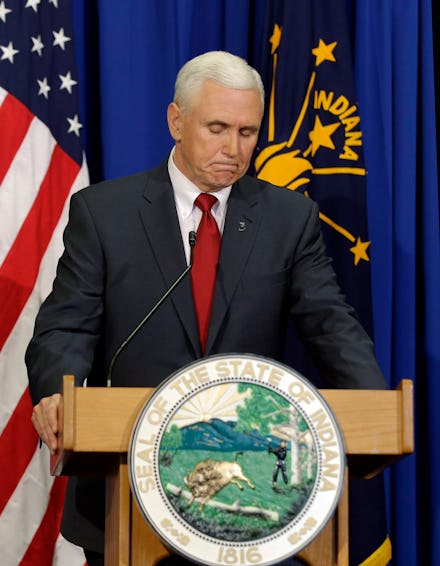The Unintended Harm in Boycotting States Over "Religious Freedom" Laws

Indiana is enduring a major public relations catastrophe over its recently enacted "religious freedom" law, chiefly in the form of a boycott from individuals, companies and other states. In addition, North Carolina and Arkansas have nearly identical measures on deck and are likely watching how Indiana deals with the financial fallout. Thirteen states have introduced "religious freedom" bills this year, seemingly as a backlash to expanded LGBT rights.
On Wednesday, Arkansas Gov. Asa Hutchinson committed to only signing an amended version of the bill in the face of pre-emptive calls to #BoycottArkansas.
This economic boycott has raised awareness around the rise of religious protection laws — but is it worth it?
The Unlikely Victims: Blanket boycotts of entire states like Indiana and Arkansas may ignore the very people who are actually under attack: the states' LGBT residents. So far, a laundry list of corporations, musicians, comedians, state and local governments, along with numerous individuals, have pledged to take their dollars elsewhere until Indiana changes its law.
For example, Mic's Greg Krieg noted that the online business Angie's List ditched a $40 million plan to expand its Indianapolis headquarters, while other businesses are threatening to leave the state. On Monday afternoon, Connecticut Gov. Dan Malloy signed an executive order restricting state-financed travel to Indiana, mirroring actions taken by the mayors of Seattle and San Francisco. And entertainers such as Parks and Recreation star Nick Offerman and indie rock band Wilco have canceled upcoming appearances in Indiana because of the law (Offerman pledged to donate proceeds from an Indiana University show on Wednesday to the Human Rights Campaign).
These actions send a bold statement: Bigotry won't be tolerated or tacitly endorsed, even if it's through concerts or conventions. But not everyone sees the blanket boycott as the right approach.
For example, Joseph Fink, a writer for the popular LGBT-friendly podcast Welcome to Night Vale, tweeted Tuesday that a scheduled live recording would go on, despite the actions of Indiana's government. Fink said that doing otherwise would hurt the people being targeted by the unfair legislation.
What's the alternative? The financial boycott has raised awareness of the harm in these laws, but the next step is challenging lawmakers and supporting LGBT people whose civil rights are being threatened, while helping advocates on the ground who can push to change this law.
With pledges to boycott Indiana gaining widespread popularity, some businesses owners are going out of their way to signal that they're allies or LGBT themselves with We Proudly Serve Everyone stickers and signage.
Economic boycotts may not hurt the wealthy or powerful, but they could cut off LGBT locals and their supporters who rely on business from outside of the state. As Samantha Allen at the Daily Dot wrote, "Draining millions of dollars out of Indiana by canceling conventions, cutting all business ties and halting interstate travel works well as a symbolic gesture but — on the ground — these strategies will disproportionately hurt LGBT people who already experience poverty at a much higher rate than their straight and non-transgender counterparts."
Instead, perhaps those with economic means should also consider redirecting their dollars to organizations working to improve the situation for LGBT people in Indiana and in other states where "religious freedom" laws appear imminent.
It's a much more sustainable way of supporting the people and leadership who are already paving the way for lasting change — sticking it to bigotry without hurting the very people who need help.